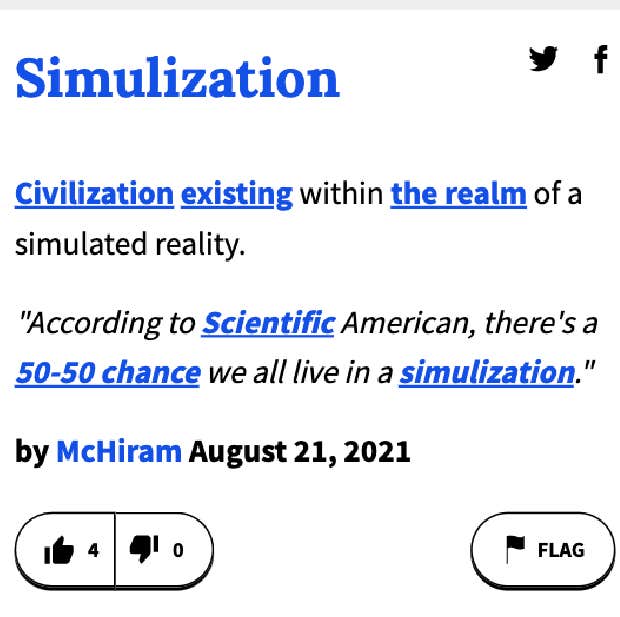'Proof' We're Living In A Computer Simulation, According To TikTok And Elon Musk
Are we living in a video game?
 HQuality / Shutterstock
HQuality / Shutterstock Conspiracy theories are nothing new on TikTok, and another one of them has gone viral, offering alleged proof we are all living in a simulated universe created and controlled by some unknown power we have no ability to grasp.
Many people get excited about this theory because it would mean there is something greater for us to discover beyond the universe we think we know. Others, however, are frightened because it would potentially mean we are all being watched 24/7, (which we already know is partially true considering our phones are listening to us much of the time).
But is it true?
What is simulation theory?
Simulation theory, also known as the simulation hypothesis, is the theory that we're actually all living in a computer-simulated reality — meaning the reality we think we think we know is entirely artificial, sort of like the concept behind the 1998 Jim Carrey film "The Truman Show" or Keanu Reeves infamous 1999 classic "The Matrix."
The theory recently caught on renewed fire after TikToker Heidi Wong shared the argument presented by Oxford University professor Nick Bostrom in a 2003 paper titled "Are You Living In A Computer Simulation?"
According to Bostrom, there's a roughly 50/50 chance that we're living in a simulation.
"This paper argues that at least one of the following propositions is true," his abstract begins. "(1) the human species is very likely to go extinct before reaching a “posthuman” stage; (2) any posthuman civilization is extremely unlikely to run a significant number of simulations of their evolutionary history (or variations thereof); (3) we are almost certainly living in a computer simulation. It follows that the belief that there is a significant chance that we will one day become posthumans who run ancestor-simulations is false, unless we are currently living in a simulation."
The reasoning behind Bostrum's theory is what's known as a trilemma, a complex problem with three potential solutions.
As Anil Ananthaswamy explained in Scientific American, the simulation argument goes like this:
"Bostrom imagined a technologically adept civilization that possesses immense computing power and needs a fraction of that power to simulate new realities with conscious beings in them. Given this scenario ... at least one proposition in the following trilemma must be true: First, humans almost always go extinct before reaching the simulation-savvy stage. Second, even if humans make it to that stage, they are unlikely to be interested in simulating their own ancestral past. And third, the probability that we are living in a simulation is close to one."
Basically, if we believe that some advanced civilization is likely to be capable of creating a simulated reality that is like existence as we know it, chances are good that we are already living in one.
TikTok videos regarding simulation theory have since garnered millions of views. And many of them contain at least somewhat believable theories and raise good questions about whether or not we may be in living in a simulation.
The odds that there is one base reality and the rest of what we experience is part of a simulation increase or decrease based on Bayesian model averaging.
In 2020, astronomer David Kipping of Columbia University offered his own analysis of Bostrom's theory in which he agreed there is about a 50-50 chance we either live in a base reality where no simulations occur, or that we are living in a simulation.
Using a mathematical estimation and prediction method known as Bayesian model averaging, Kipping says "the probability that we are sims is in fact less than 50%."
However, he furthers the original argument by explaining that once humans create a simulation that harbors conscious beings, the chances shift so that "you are only left with the simulation hypothesis."
"The day we invent that technology, it flips the odds from a little bit better than 50–50 that we are real to almost certainly we are not real, according to these calculations," Kipping says.
If you take a look at the quality of the video games humans have created over just the past couple of decades, it doesn't seem all that outrageous to believe these characters could someday soon be conscious beings.
“Honestly, this does make sense if you think about how realistic video games are getting day by day and all the little glitches you see in the world that are unexplainable would make sense behind this theory,” TikToker Nikki Jain says.
When TikTokers refer to “glitches in the matrix” they are referring to videos and pictures of captured things that are either unexplainable or that seem impossible.
This may mean “cars hitting invisible objects, planes staying in one place in the sky, dogs randomly appearing,” as referred to in Jain’s second simulation theory video.
Elon Musk has shared his own beliefs about simulation theory
TikToker Scarlett Mills shared a series videos detailing the history of this theory, noting that notable scientific minds like Elon Musk and late physicist Stephen Hawking have spoken about their belief in the plausibility of simulation theory.
During a panel discussion at the 2016 Code Conference, SpaceX founder and Techno King of Tesla Musk stated that "the odds that we are in base reality is one in billions."
"And actually, I mean arguably we should hope that that's true," Musk continues, "because otherwise, if civilization stops advancing, then that may be due to some calamitous event that erases civilization. So maybe we should be hopeful that this is a simulation because otherwise ... either we're going to create simulations that are indistinguishable from reality or civilization will cease to exist. Those are the two options."
In 2021, Wade McKenzie, one of the metal artists behind the monolith that popped up in California back in December of 2020, coined the term "simulization," which he defines on Urban Dictionary under the handle McHiram as "Civilization existing within the realm of a simulated reality."
This label seems apt if used to describe our civilization as Musk refers to it if simulation theory is, indeed, correct.

TikToker Ashley Lanese agrees with Musk's assessment, comparing humans to Sims but asserting that even though the Sims are part of a game, they are able to make their own decisions.
“If life is a simulation, then that means to me, that we have more choice, more chance to choose the life that we desire,” she says.
According to philosopher David Chalmers, there is certainly a possibility that we're living in a simulation. But that shouldn't change anything.
"If we discovered we’re in a simulation, that would change some things. We might want to escape the simulation and get beyond it. At the very least, maybe we’d want to try and communicate with the simulators," he says in an interview.
"But I think that simulation or no simulation, life is still perfectly meaningful."
Megan Hatch is a writer who covers celebrity and entertainment news and loves internet pop culture. Follow her on Instagram and on Twitter for artsy and funny content.

